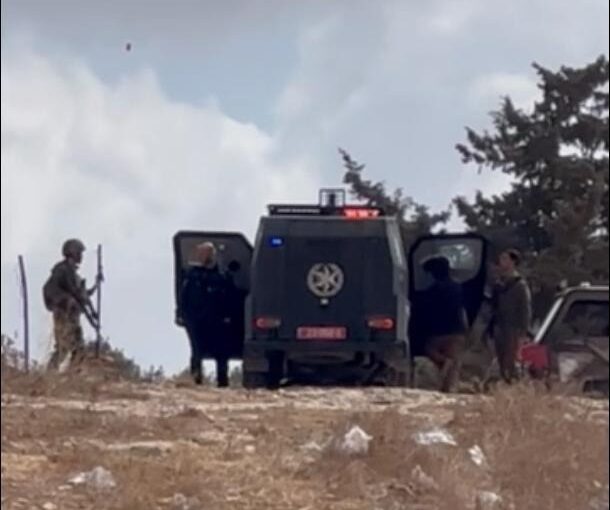Israeli colonial settlers and Knesset Members celebrated on social media the de facto deportation of two German citizens, who were imprisoned by the Israeli authorities, from the occupied Palestinian territories to Jordan on Sunday October 6th. Itamar Ben Gvir and Tzvi Sukot posted about the expulsion of German activists as an achievement for their special task force and governmental committee, which was created to deal with what they call “dangerous anarchists” in the West Bank. Israel’s criminal right wing government uses the term “anarchists” to refer to all Israeli and international human rights defenders who are supporting Palestinians living under illegal occupation in the West Bank.
According to eyewitnesses, on the morning of October 2, the two activists were arbitrarily arrested by Israeli forces in Masafer Yatta (South Hebron Hills) as they accompanied a Palestinian farmer to his garden in the village of Tuwani. The Palestinian farmer they were accompanying faces daily harassment, attacks, and invasions of his private land by Israeli settlers and occupation forces, which all make it difficult for him to access his land, to cultivate it, and even to remain in his home. Police claimed in court that the activists had entered a settlement, confronted a soldier and disturbed him in fulfilling his duty. These claims contradict video footage of the arrest.
The onslaught of harassment against Palestinian residents of the region of Masafer Yatta extends beyond Tuwani. Every village in the area is affected. In the village of Zanuta in this same region, residents have been forcibly displaced multiple times despite a court ruling in their favor. Residents of Um Durit have had their livestock and property stolen and destroyed, and their land abused by settlers. Last July, around 200 settlers launched a coordinated attack in which they destroyed vehicles, burned fruit trees and beat up residents in Khalet Al Daba’a and Um Fagarah. In the past year, at least 19 Palestinian communities in the occupied West Bank have been forcefully displaced by Israel settlers with the support of the Israeli occupation forces.
The activists were transferred to the central unit in the occupied West Bank near the Malleh Adumim colonial settlement. The police illegally broke into the phone of one of the activists and questioned them about photos on their phones of signs and stickers condemning the genocide in Gaza and supporting Palestinian rights. The police alleged that this proved that they supported terror and were terrorists. They were also questioned on whether they knew about the International Solidarity movement (ISM), and were shown a presentation on the organization with pictures of Israelis and internationals and asked if they knew them.
The activists were taken to court and accused of three offenses: disturbing a police officer/soldier performing his responsibilities, membership in an illegal association, and “sympathizing and identifying with a terror organization”. According to the police, the illegal association they are members of is ISM, which they claimed has been designated as forbidden to work in Israel and the West Bank.
It is important to note that while many respectable human rights organizations have been designated as terror organizations by Israel, the ISM has not yet been designated as forbidden, nor has any international ISM activist ever been indicted and charged with a crime in Israeli courts.
The German citizens were imprisoned in harsh conditions from Wednesday to Sunday and then given the option of leaving through the King Hussein bridge, and they are now in Jordan. For similar vague and unsubstantiated accusations, Palestinians are frequently arrested and tortured in the West Bank, and in Gaza the accused are murdered along with their families.
This most recent set of arrests is part of the ongoing barrage of harassment by Israeli settlers and soldiers of Palestinians and of human rights activists in area, and comes in the wake of the murder of ISM volunteer Ayşenur Ezgi Eygi in the village of Beita during a protest against settlement expansion on the village’s land.

